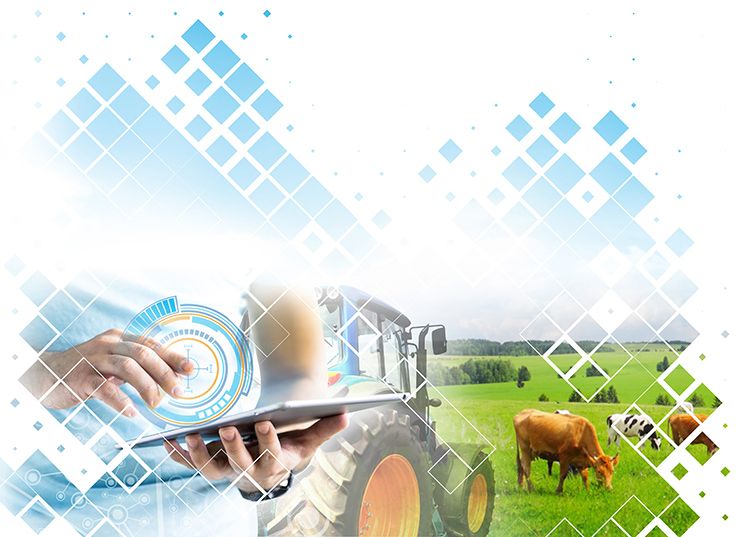
EIP-AGRI seminar brought together at Kilkenny (Ireland) the most relevant european actors in Smart Farming reality
Phil Hogan, European Commissioner for Agriculture and Rural Development, cited as an example the Galician project during his closing speech
Luis Pérez-Freire, executive director at Gradiant, and Alfonso Ribas-Álvarez, representing Galician Institute of Alimentary Quality (Ingacal), depending on Ministry of Rural Affairs of Xunta de Galicia (regional government); and Ismael Martínez from dairy cooperative CLUN, presented the activities carried out so far within the Digital Innovation Hub, as well as the future steps to promote the digitization of the agrifood sector in Galicia. As Pérez-Freire said “the fact that the European Commission has invited the Galician initiative as an example of good practices in public-private collaboration is a recognition of good work done and an international projection for Galicia as a pioneer region in the field of digitization of the agrifood sector”.
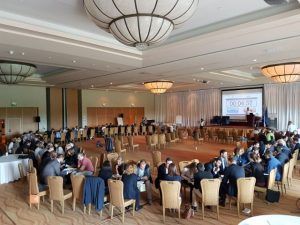
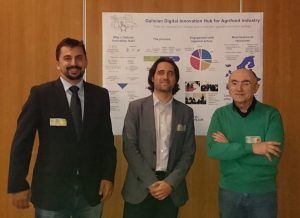
The event, hold in the irish town of Kilkenny on June 1st and 2nd, brought together public policy makers, technology and research centres representatives, professionals from the agrifood industry and investors, from 24 member states of de European Union; and it has as main goal to share experiences, good practices, obstacles and priorities in establishing digital innovation hubs for the agrifood sector in Europe.
The Galician project, pioneering model
Promoted by Gradiant and Campus Terra – USC, with the support of Xunta de Galicia (regional government), the Digital Innovation Hub for Galician agrifood sector has been highly praised by the staff of European Commission, responsible for public policies and research centres of all member states.
Galicia as guest speaker in this EIP-AGRI seminar “represents the international recognition for agrifood sector innovation strategy pulled by the Galician government”, says Alfonso Ribas, who underlines the good reception of the Galician proposal “placing Galicia in the group of European reference regions in the digitization of the agrifood sector”.
“Combining a ‘bottom-up’ approach, a close collaboration between private and public sectors, the light work structure and the alignment to regional strategy of specialization are the basis of our success” point the leaders of the Galician project. A project that received the express reference of Phil Hogan, European Commissioner for Agriculture and Rural Development, during his closing speech congratulating Galicia and Tuscany regions for the work developed in this field.
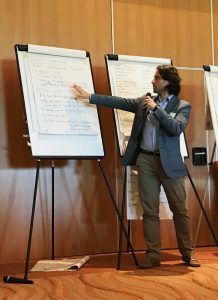
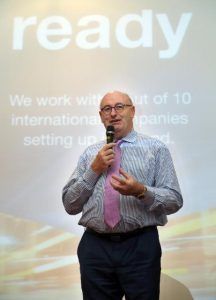
In addition to analyse, through the Galician example, the keys of public-private collaboration and the importance of the regional component, during the seminar the participants discuss about the other necessary pillars to establish digital innovation hubs, such as competence centres, entrepreneurship, private investment, innovation brokers and involving agrifood community, which should be the final beneficiaries of the innovations
Future digitization of agrifood sector
The digitization of the European agrifood industry is one of the main priorities of R&D&I policy in Europe for the coming years, showing a full commitment with the agrifood sector in its bid to digitization as one of the key elements for the future sustainability of the sector.
“One of the lessons Europe leaves us, which we are already applying in Galicia, is the necessary close collaboration between different departments of the Public Administration” explains the executive director of Gradiant. Therefore, the activities of Galician Digital Innovation Hub will focus in the next months on the integration of the innovative Galician ecosystem, carrying out activities to involve all the necessary agents (government, cooperatives, ICT technology centres, agrifood research centres, producers, ICT companies, universities, etc.) to make easier the adaptation to digital innovations and, more importantly, to make easier the way to create new technology solutions develop in Galicia.


